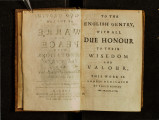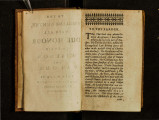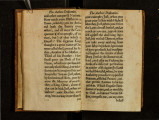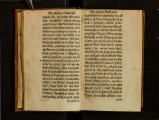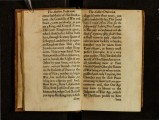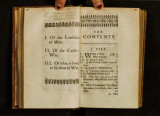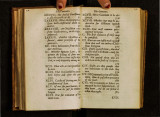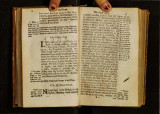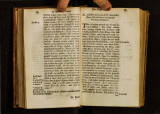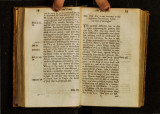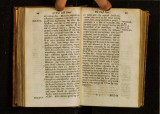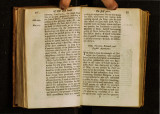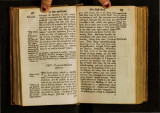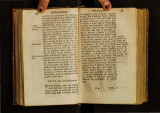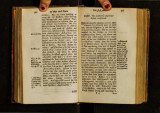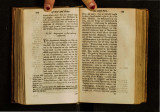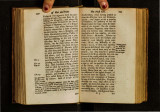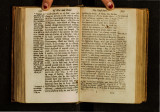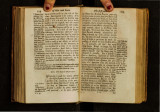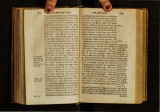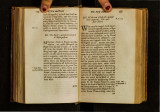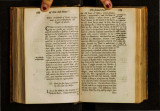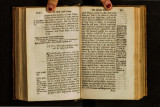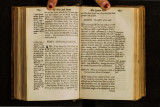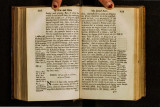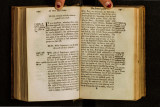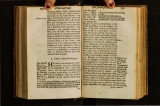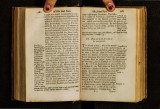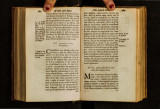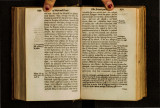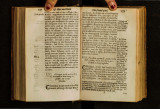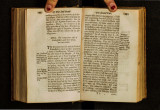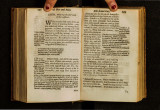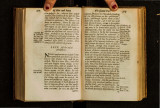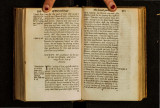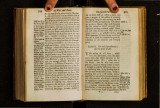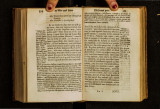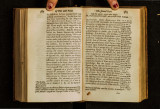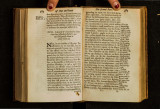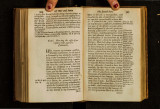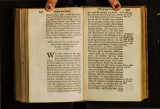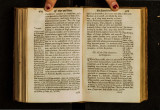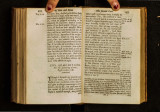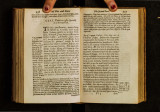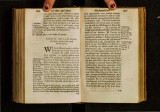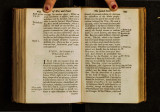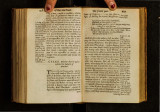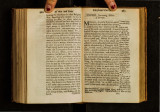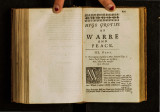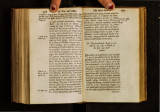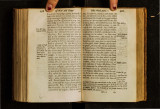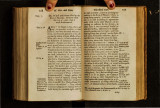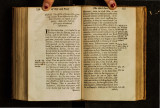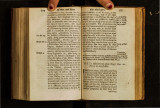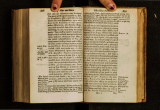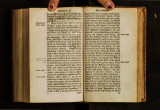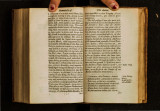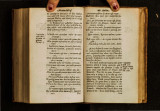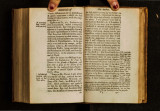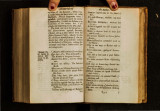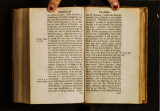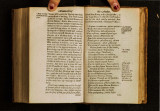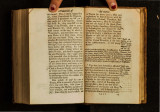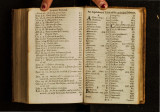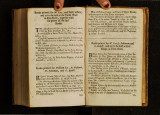| OCR Text |
Show of Wttr ttnd Pt4ce he laugheth and mocketh at wicked men~ And moreover , the lall Judgment , afrer which no Amendment is expected , and alfo fome fecret punifhments in this life, as c.>bduration , evince it to be true, that we fay againfi Plato. Neverthelels man, when he punifheth man , that is by na- . ".rh. ':t.q;1 oS. ture equal. to him, ought t? ~ropofe fo~eSilv. zn verb. what ro h1mfelf. And th1s IS that whtch vindifla. the Schoolmen fay, the mind of the pu-ni£ her ought not acquiefce in the evil of any one. Yea, before them Plato in his GorgiM faith, They that puni0.1 any one with death, or exile , or mulct, do will it' not Jimply ' but for rome good end. S en. l1'b • .-. .. de And Seneca:r'Pe muft come to ven~eance, ira. c. p. not as ifit V.'ere [weet to revenge, ut pro- Idem,c.:u •. jitable. And y'/riftotlef1ich,Some things Ex{equar 91~UI_ are honefl: jim ply, fome upon ''~ccj] ty, and opo?tet non qu1a . I f- h ] . h detee. ' ~~~es an exa~p e o t c atcr m t e cxa. Aritt 1. de ct1on of pumfhment. repub. c. 13. t Mimus: L.e[o doloru reme- LX X X l. In what {en[e Revenge {s naturally unlav.ful!. dium inimici · · · · d h dolor. Cicero WHerefore that wh1ch IS fa1 ! t at Vol(}mn ait pre- the pain t of the in jurd perfon is na mitig~r~. cas' d by revenge or punifhment of the Idem dtctt offender agrees indeed with that natu~·e Pluurchu ~ ex · . ' · h b 11 + Simonide. wh1ch man .hath common Wit eans · For , anger " Inde ilb Homcric2 : is , as in -ilium fer a prenderat ir11. item~ . beafis , fo E.ffirat ipft animum magnum ftbi peflore 111 a ttl. in The fec~nel P.ar.t. 3 I i~ in man, as Euftathius tightly defines it , a fervour t of the Maud · about the htart t ~ndt;~lc.Jrll from an appetite of revenge: which appe- ~1-.orbdemex• ~i'te is ofit felf fo void 'of reafon, that it 1s tmguere, ofttn carried againfl: thofe things that did no hurt, as , -againll the yong ones of. 'the beafi that:h hath offended, or , againfl:. things fenfelefs * , as againll: a £lone *Sen. de ira I. thrown at a dog. But fuch an' appetite z. c. 2.6. Hu confidered in it felf ~rees not to the ra- irafci·quam tiona! part whofe oftlce 'tis to commandf!uttume(t,qu.e h a: .a.· ' f; ~rAm noftr am t e ane~'-10ns t : and there o:e not :~ the nee meruerunt, Law ofNature,becaufe that IS the dtdate nee [entirmt. of the ra tiona} and foci a! Nature ,as iuch .· Brafiliani, feri Now , reafon di&ates , man mult do no- homin~s , de t hm. g to h urtanot he r man , un I e1r.s 1• t ha ve fhe rroin, ett a ufet de fome good end. And in the pain of the vf:d i ca~r. enemy alone, fo nakedly confider' d, there t Vtde qu~ in is no good but fa He and imaginary : as in bane r~m sme. fuperfluousriches,and many other things ca de zral. '· of like fort. In this fen(e, not only Chri- ~a;ia~~ Gorr,ia. fiian Doctors, but Philofophers too*, vide de eo Theo. condemn revenge in men. Senet:a t: Re- doretum lib. 2.o. venze Is an mhuman word , received in- cuLr~bttoJJud •• d. ce d Jr0. 1' J·U .J 1~1~ o'-ut d t ffie rs· f rom contumely ct aJ J· P• 2·.. ezra. tn order only: He that returneth pain, of-fend. r, only he hath fome excufe. Yea , if we beli-eve Maximus Tyrius,He is more unjuft, who revengeth himfe!f, than he, who gave the ftrft hurt. Mu[onius faith, To d'-evife how one ma7 hite him 'that bites, a~:d hurt him that hurts, is the part of a he4jf, non of a man. In 'Plutarch Dian, He that turned Plrtto's wiiedom to civil |






